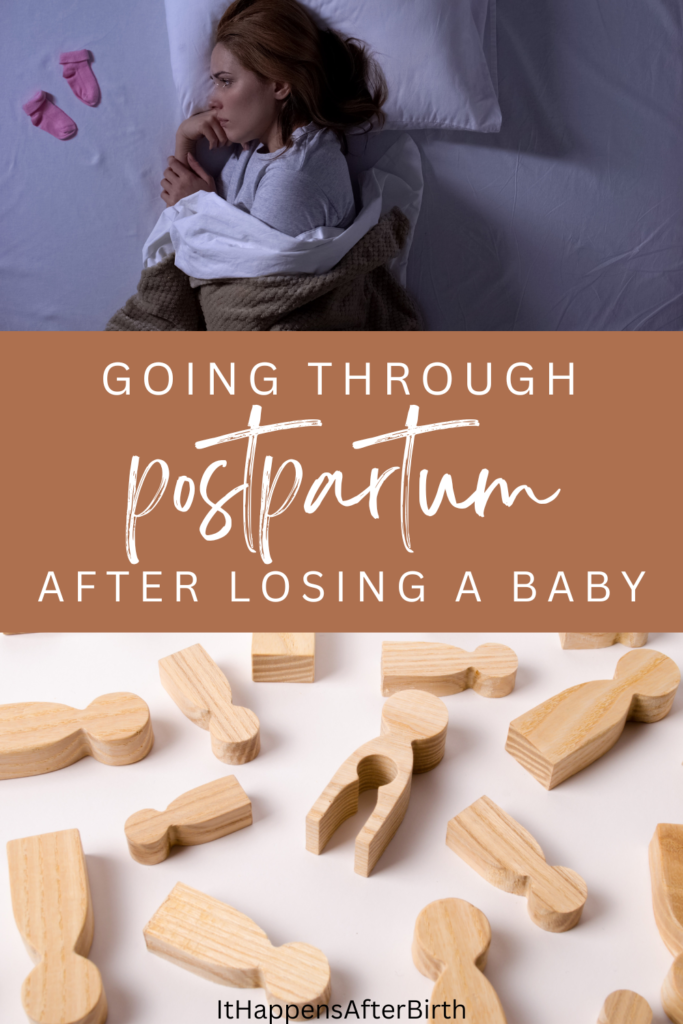How do you heal? How do you go through postpartum after losing a baby?

It’s something that no parent should ever have to go through. Losing a baby, whether through miscarriage or stillbirth, shatters your life in a way that will never be repaired. Yet 1 in 4 parents will find themselves facing this exact heartbreaking scenario.
Finding out that your baby is no longer alive in your womb brings your entire world to a halt- and it feels like everything else should stop along with it.
Sadly, as much as you would like to hit pause on that moment (as much as you would like to rewind from that moment to one where your baby was safe and healthy), your baby will have to leave your womb. That means you will have to go through birth, and you will have to go through postpartum.
How do you do that? How can you even begin to go through a postpartum after loss?
In many physical ways, postpartum after loss is the same as a regular postpartum
There are people out there who think that because you don’t physically have your baby in your arms, that means that you’re not actually recovering from a birth. Don’t listen to those people- however difficult it may be.
You still birthed your baby, whether it was a miscarriage or a stillbirth. Your body went through the physical sensations of labor, and now it needs to heal physically as well.
Helping your body to heal after birth will be the same, no matter what. Things like: give yourself time to rest, don’t do too much too soon, eat nourishing foods, and make sure to take care of your stitches if you have them.
Take care of yourself physically
Depending on your type of loss and how you chose to birth your baby, your body will be impacted differently. You might have had an assisted miscarriage, or miscarried at home. If you had a stillbirth, you might have chosen to have a c-section, or you might have birthed vaginally.
Your muscles are going to be sore from contracting, and you might have stitches from a tear, episiotomy, or cesarean. Take it easy physically for as long as you need to- many care providers recommend at least a week after birthing. Hot compresses and sitz baths can help with soreness and pain. Honey could be an option for healing incisions.
Monitor yourself for any signs of infection- fever, increased bleeding, unexplained pain, and foul-smelling discharge are all suspicious for a possible postpartum infection.
It would be understandable if you didn’t feel like eating at all after losing your baby, but it’s an important part of helping your body to recover. Even if you find yourself with little to no appetite, try to eat small portions of very nutritious meals. You can also continue taking prenatal vitamins for a short while.
Decide how you want to take care of your breastmilk
If you lost your baby after sixteen weeks, you’ll already have started making milk. Your care provider may or may not give you something to help dry up your supply, but your milk is still going to come in. This can be painful, both physically, and as another reminder of what you’ve lost. It can take a while for your milk to dry up completely.
Drinking peppermint tea can help with drying up your supply, and wearing a more supportive bra (such as a sports bra) can help with the process too. If your breasts get sore, painful, and engorged, you might want to express a small amount of milk to help ease the discomfort. Breastmilk works on supply-and-demand, so you won’t want to remove too much. A small amount of hand expressing or pumping will work. You can also stand in the shower and run warm water over your breasts.
Some women might choose to continue lactating, and will donate their pumped milk to a breastmilk bank for other newborn babies to use. Whether or not you would want to do this is completely up to you. Though some see it as a way to honor the baby that they lost, others find the idea of it uncomfortable.
Give yourself space to grieve
Everyone approaches grief differently. There’s no set time, order, or way to mourn loss.
You might feel numb, or you might be feeling everything at once. Both are okay. Don’t feel like you need to heal on anyone else’s timeline other than your own.
The feelings you experience are going to be difficult, excruciating, and possibly even confusing.
Giving yourself space to mourn for your baby is extremely important, however that may look for you. If you want to be left alone for a while, that’s absolutely okay. If you’d rather be spending time with other people, that’s okay too.
You may want to pack up all of your baby things right away, or you might want to keep it out as a reminder of your baby. Both options are valid. Don’t let anyone pressure you into doing something or grieving in a way that you don’t feel comfortable with yet.
Set boundaries
Boundaries are necessary during every postpartum, but especially during postpartum after losing a baby. Your body is healing. Your heart is shattered. And you’re just starting the journey of mourning a loss that has forever altered your life.
Take an honest look at what you need during this time, and honor your need for it. Set those boundaries and do not feel guilty about it.
It might mean turning off your phone for a while, stepping away from social media, or even blocking/muting certain people that you follow online. It could mean distancing yourself from some people you know in real life for a while.
Your family and friends should want to support you during this time, and are even grieving right along with you. However, they might not always know how to navigate being there for you. Setting boundaries helps you and them.
Whether it’s having a preference on if or when your baby’s name is spoken, not wanting to discuss certain parts of your experience, or asking to avoid all events baby-related for a while, express your boundaries and stick to them.
Ask for help
No one can help you with what you want most- which is to have your baby, and not this heartbreaking reality of loss.
But they can help in lots of other ways. They might even feel relieved to be asked, especially if they’re not sure how to support you otherwise.
What you’re going to need help with in your situation is unique to you, but some possibilities are:
- Bringing a meal
- Helping out with chores or basic errands
- If you have other children, taking them out for a couple hours (or doing an activity at your house)
- Going out for coffee
- Help with organizing the funeral
- Help packing up some of your baby’s things
- A listening ear
Be gentle with your mental health
It’s safe to say that after losing a child, your mental health will go to many different places. What you are going through is one of the hardest things in the world. A storm of grief is whirling through your head and through your heart. And at this point, you’re not even sure how you’re going to make it through.
On top of experiencing what’s commonly known as the five stages of grief (denial, anger, bargaining, depression, and acceptance), you could also experience a postpartum mood disorder. Having to go through postpartum without having your baby is undeniably difficult.
One of the best first steps for your mental space is giving yourself space to grieve how you need to, and setting boundaries. Spend more time with the people who help you to mourn. Spend less time with the ones who don’t understand how you grieve (or why their comments and questions are insensitive).
If you want to be with others who actually understand what you’re going through, you can find a support group for pregnancy and infant loss. A lot of times you can find a group that is very specific to your type of loss. (i.e., ectopic pregnancy, early miscarriage, full-term stillbirth, and so on.) The support groups are sometimes offered online, and sometimes in person.
You could even look for a Facebook group for parents who have lost their child through miscarriage or stillbirth.
If you prefer talking to someone one-on-one, you can connect with a trusted friend, with another loss parent, or a counselor who specializes in grief and loss.
Another good option is to find an outlet for your grief through journaling, art, music, or any other creative form.
Find the way you want to honor your baby
You’re never going to forget your baby- they will always live on in your heart and in your memories, and you will always love them. But if you’re looking for a tangible way to honor them, there are a few different things you could choose to do.
If you miscarried, you can choose to name your baby. Even if you lost your baby to an early miscarriage and aren’t sure of their gender, you can still choose a special name for them. And while you may not have a cemetery or headstone to visit, you can plant flowers or a tree in their honor.
If your baby was stillborn, you can have photos taken of them right after birth to remember them by. A lot of hospitals have a photographer they call in just for this purpose, but in case there isn’t one on standby, you can check out this website to find one in your area.
You could also choose to get a remembrance bear made- this is a stuffed bear that is created to be the exact length and weight of your baby at birth. This is extremely helpful not just as a keepsake, but for the aching arms that so many stillbirth moms experience postpartum.
If you do have breastmilk, you could choose to pump enough to have breastmilk jewelry made. It can be a necklace or a ring, and a way to keep a reminder of your baby close to you.
Another option is creating a shadow box out of things that were specially for your baby. Depending on how far along you were at the time of loss, the things you choose to put in will look different. But some options are: hospital wristbands, lock of hair, socks, first outfit, sonogram picture, and a special toy or stuffed animal.
However you choose to honor your baby, make sure that it’s something meaningful and comfortable for you.
This is a lifelong journey of grief
Once you lose a baby, you will never be quite the same again.
Eventually, your body will heal, and your postpartum will end. The intensity of your emotions may subside, and over time your grief will grow and change. But it will never go away completely.
You lost someone you love- someone who was physically a part of you. There will never be a time that you forget your baby, or stop missing them, even if you go on to have more children afterward.
Your grief is real, and it is valid.
If you are walking this journey of postpartum after loss, I’m so sorry. I wish you comfort now and always.
If you want to share your story of loss in the comments, please feel free. This is a safe space and we would be honored to hear about your baby.

